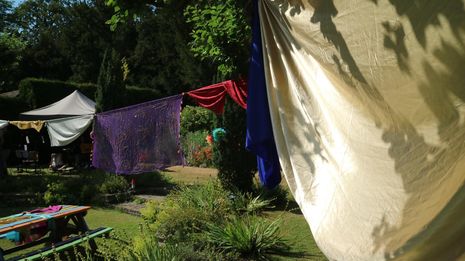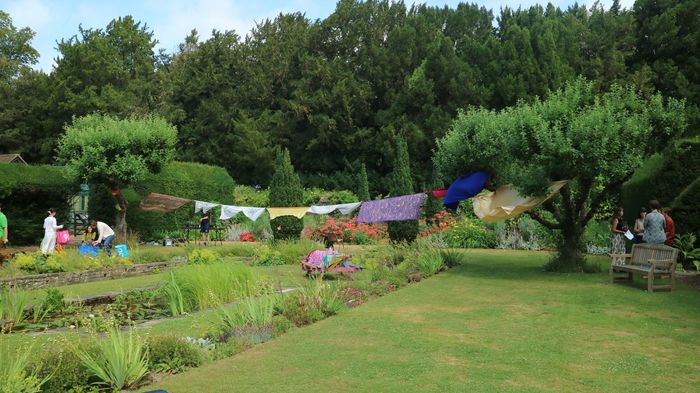Remembering the midsummer madness
Eleanor Baldwin reflects on the joys of outdoor Shakespearean theatre

“The minute he killed Duncan, it started pouring with rain.” My friend texted me this a few weeks ago after watching Macbeth at the Minack Theatre in Cornwall. Back in July, I had watched Shakespeare in Love on the same cliffside stage, an incredible production that shone under the summer sun. I had always thought my English teachers were overstating pathetic fallacy. Yet, I can’t deny that the image of rain cascading during Macbeth’s downfall, or of sunlight shining on reunited lovers, felt boldly symbolic. On those Cornish cliffs, the weather became an extension of the stage, an active element of the dramatic tableau.
“It’s entrancing to see a performance come alive like this”
Later, my friend mentioned she had seen Cambridge’s Gilbert and Sullivan Society’s Pirates of Penzance at the Minack. She spoke about how the production thrived in the open setting: the sound of waves crashing against the cliffs heightening the audience’s immersion. It’s entrancing to see a performance come alive like this, unconfined by the walls of a room and spilling out into the surroundings. For all the risks the elements pose when staging theatre outdoors, when they enhance the stage in this way, a show becomes undeniably more alive and unforgettable.
The Minack Theatre itself was born in 1929, inspired by an outdoor production of Shakespeare’s A Midsummer Night’s Dream. Staged in a meadow, this first performance drew considerable applause. It is hard to imagine a more fitting stage for such a fantastical plot, where romance tangles with mischief and chaos. Among the numerous iterations of this play I have seen over the years, my favourites have always been staged outdoors. A recent production that made incredible use of its setting was that of last Easter term, staged in Clare College’s Fellows’ Gardens. Lounging on a patterned rug, bathed in sunlight, I was struck by the natural beauty of the backdrop. On this stage, the actors’ performances were deeply compelling, alongside the mellifluous tones of the live band: particular standouts were Elena Brown Moreno’s Puck and Chester Chen’s Bottom. The play was also alluring in its interaction with the audience, drawing us into a whirlwind of mayhem, reminiscent of a garden party gone delightfully awry. We became a part of their world, swept up in the quibbling of fickle lovers as they rushed through bushes and tumbled across the stage. This intimacy only heightened the comedic value, leaving us laughing both at the scene unfolding before us and at the reflection of ourselves in their folly.
“Outside, it feels as if we are not only watching a play, but living inside it”
In the Fellows’ Garden at Trinity Hall, the Preston Drama Society’s Henry IV, Part I was equally enchanting by its comedy. This production reinvigorated the classic play, leaning into the humour in the clash between the drunken heir’s carefree revelry and the looming weight of political responsibility. Framed by the magical notes of the live choir, this comedy of courtly chaos was a delight to watch. Basking in the warm June sun with white wine in hand undeniably made this a particularly enjoyable and memorable experience. It reminded me of The Lord Chamberlain’s Men’s production of Twelfth Night which I watched against the backdrop of Lichfield Cathedral over the summer. The grandeur of the cathedral framed the play’s charming comedy, making it feel intimate yet expansive. The cathedral glowed in the soft evening light, enhancing the romantic elements of the play. Outside, it feels as if we are not only watching a play, but living inside it. This intimacy is what makes the performance linger just a little longer after it ends.
Outdoor theatre comes alive in the moment when the audience, actors, timing, setting, and production team (and weather) come together. The unpredictability of the elements encourages a unique creativity, with the open-air setting amplifying every aspect of the production. As we go into this academic year, I’m looking forward again to the summer plays of Easter Term – to the June sun, white wine, and a welcome chaos!
 News / Right-wing billionaire Peter Thiel gives ‘antichrist’ lecture in Cambridge6 February 2026
News / Right-wing billionaire Peter Thiel gives ‘antichrist’ lecture in Cambridge6 February 2026 Features / From fresher to finalist: how have you evolved at Cambridge?10 February 2026
Features / From fresher to finalist: how have you evolved at Cambridge?10 February 2026 Film & TV / Remembering Rob Reiner 11 February 2026
Film & TV / Remembering Rob Reiner 11 February 2026 News / Churchill plans for new Archives Centre building10 February 2026
News / Churchill plans for new Archives Centre building10 February 2026 News / Epstein contacted Cambridge academics about research funding6 February 2026
News / Epstein contacted Cambridge academics about research funding6 February 2026










